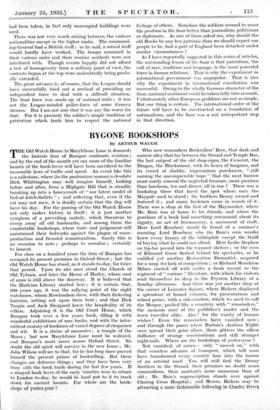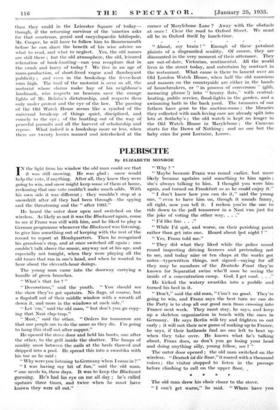BYGONE BOOKSHOPS
By ARTHUR WAUGH
THE Old Watch House in Marylebone Lane is doomed; the historic firm of Bumpus confronts eviction ; and by the end of the month yet one more of the familiar haunts of the book-lover will have been sacrificed to the inexorable laws of traffic and speed. An event like this is a milestone, where (in the pantomime season) a desolate Dick Whittington may. well imagine himself, looking before and after, from a Highgate Hill that is steadily breaking up into a honeycomb of " our latest model of bed-sit-kitch-flatlets " ; and reflecting that, even if the cat may not mew, it is deadly certain that the dog will have his day. For the passing of the Old Watch House not only makes history in itself ; it is just another symptom of a prevailing malady, which threatens to sweep away all old landmarks, and among them the comfortable bookshops, where taste and judgement still maintained their bulwarks against the plague of mass- production and frenzied sensationalism. Surely this is an occasion to note ; perhaps to moralize ; certainly to lament.
For close on a hundred years the firm of Bumpus has occupied its present premises in Oxford Street ; but the Old Watch House has stood, as it stands to-day, for twice that period. Upon its site once stood the Church of Old Tyburn, and later the House of Harley, whose coat of arms is still above the doorway. It is believed that the Harleian Library started here ; it is certain that, 200 years ago, it was the rallying point of the night watchmen, whom Rowlandson drew, with their flickering lanterns, setting out upon their beat ; and that Dick Turpin and Jack Sheppard _knew the hospitality of its cellars. Adjoining it is the Old Court House, which Bumpus took over a few years back, filling it with wonderful exhibitions of rare books, and with the inter- mittent oratory of bookmen of varied degrees of eloquence and wit. It is a shrine of memories ; a temple of the Muses ; but now Marylebone Lane must be widened, and_ Bwnpus's must move across Oxford Street. No doubt the old spirit will survive in the new home ; Mr. John Wilson will see to that, for he has long since proved himself the present prince of bookselling. But these changes are dolorous things ; and they have been very busy with the-book trade during the last few years. If a strayed book lover of the early 'nineties were to return to London to-day, he would be hard put to it to track down his ancient ' haunts. For where are the book- shops of yester-year ? Who now remembers Booksellers' Row, that dark and narrow alley that lay between the Strand and Temple Bar, the last outpost of the old shop-signs, the Crescent, the Dragon, the Blackamoor, with its boxes of bargains, and its crowd of shabby, impecunious purchasers, " still nursing the unconquerable hope " that the next barrow -must surely conceal the neglected treasure, more precious than luncheon, tea and dinner, all in one ? There was a bookshop there that faced the spot where once the Maypole used to stand ; the brothers Denny owned and fostered it ; and many bookmen came in search of it. There was a shop at the foot of the Haymarket, where Mr. Bain was at home to his friends, and where the purchase of a book had something ceremonial about its dignity, an act of freemasonry, a sacrament of craft.: Here Lord Rosebery would be found of a summer's morning, Lord Rosebery who (in Bain's own words) knew every luxury of the bibliophile except the thrill of buying what he could not afford. Here Leslie Stephen on tip-toe peered into the topmost shelves ; or the eyes of Edmund Gosse flashed behind his spectacles, as he cuddled yet another Restoration Dramatist, acquired for a song, for lack of competition ; or Richard Monckton Manes carried off with smiles a fresh recruit to the regiment of " curious " literature, with which his visitors read themselves to sleep in the Fryston Library of a Sunday afternoon. And there was yet another shop at the corner of Leicester Square, where Bickers displayed a splendour of bound volumes, for presentations and school prizes, with a side-window, which we used to call the Morgue, packed like a cemetery with " remainders," the memento mori of the publisher's reader and the town traveller alike. Alas ! for the vanity of human wishes ! Even the remainders have vanished now ; and through the panes where Burton's Arabian Nights once spread their grim allure, there glitters the silken dalliance of strange combinations and still stranger night-rails. Where are the bookshops of yester-year ?
Not vanished, of course ; only " moved on," with that ceaseless advance of transport, which will soon have transformed every country lane into the horror of an arterial road. You will .still find the Denny brothers in the Strand, their premises no doubt more commodious, their assistants more numerous than of old ; Mr. Bain's superscription stands over against Charing Cross Hospital ; and Messrs. Bickers may be attracting a more fashionable following in Charles Street than they could in the Leicester Square of today— though, if the returning survivor of the !nineties asks for that courteous, genial and encyclopaedic bibliopole, Mr. Cooper, he will have to follow him to Bournemouth before he can share the benefit of his wise advice on what to read, and what to neglect. Yes, the old names are still there ; but the old atmosphere, the old, leisured relaxation of book-hunting--can you recapture that in the crush and hurry of today ? We live in an age of mass-production, of short-lived vogue and flamboyant publicity ; and even in the bookshop the fever-heat runs high. The trail of the motorist is over us all, the motorist whose claims make hay, of his neighbour's landmark, who respects no beacons save the orange. lights of Mr. Belisha's dictatorship, and respects them only under protest and the eye of the law. The passing of the Old Watch House seems like a symbol of the universal break-up of things quiet, disciplined, and comely to the eye ; of the hustling out of the way of peaceful pursuits and all the harvest of scholarship and repose. What indeed is a bookshop more or less, when there are twenty lorries massed and interlocked at the corner of Marylebone; Lane ? Away with the obstacle at once ! Clear the road to Oxford Street. We must all be in Oxford itself by lunch-time.
, • •. • • " About, my brain ! " Enough of these petulant plaints of a disgruntled. senility. Of course, they are discounted in the very moment of their utterance. They are out-of-date, Victorian, sentimental. . All the world lives in the street today, and entertains by contract, in the restaurant. What cause is there to lament over an Old London Watch House, when half the old mansions and manors on the countryside are either in the hands of housebreakers,, or " in process of conversion " (glib; menacing phrase 1) into " luxury flats," with central- heating, public service, flood-lights in the garden, and a swimming bath in the back yard. The treasures of our fathers have gone to the auction-room ; the libraries they collected with such loving care are already split into lots at Sotheby's ; the old watch • is kept no longer. in the Old Watch House in Maiylebone ; the Caravan starts for the Dawn of Nothing ; and no one but the baby cries for poor Lorraine, Lorree.















































 Previous page
Previous page